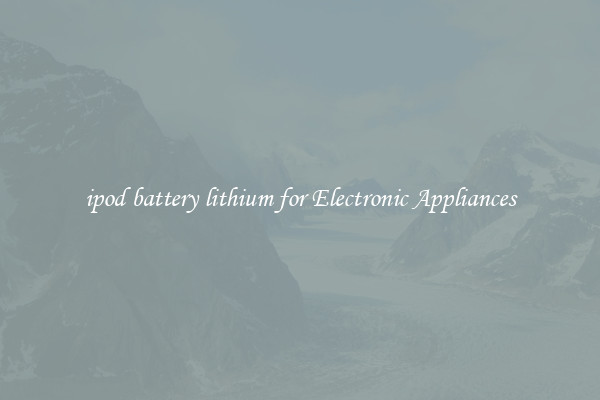ipod battery lithium for Electronic Appliances
The Role of Lithium-ion Batteries in Powering Electronic Appliances

In the world of portable electronic appliances, lithium-ion batteries have become a staple due to their exceptional performance and energy density. Particularly, when it comes to devices like iPods, these batteries are the go-to choice, providing the ideal power source for extended playback time.
Lithium-ion batteries consist of several key components. One of the most critical is the anode, which is typically made of graphite. This anode allows lithium ions to move between the anode and cathode during charging and discharging cycles. The cathode, on the other hand, is made of a lithium-based compound which can store an abundance of lithium ions.
One of the significant advantages of lithium-ion batteries is their high energy density. This enables them to store a considerable amount of energy relative to their size and weight. In the case of iPods, this means a compact battery can provide a significant amount of playback time, allowing users to enjoy their favorite music and videos for extended periods.
Another significant benefit is the absence of the "memory effect." This effect is commonly seen in older battery chemistries, such as nickel-cadmium batteries, where they gradually lose their maximum capacity if not charged and discharged fully. Lithium-ion batteries, on the other hand, do not suffer from this effect and can be charged at any state of charge without harming their capacity.
Furthermore, lithium-ion batteries have a low self-discharge rate, meaning they can retain their charge for extended periods when not in use. This is particularly advantageous for electronic appliances like iPods, which may not be used regularly. With a lithium-ion battery, users can pick up their device after a few weeks and still have a meaningful charge remaining.
However, it is worth noting that lithium-ion batteries should be handled with care. Because they contain highly reactive lithium, mishandling or abuse can result in thermal runaway, leading to overheating and potentially causing a fire or explosion. It is crucial to use the appropriate charging equipment and avoid subjecting the battery to extreme conditions, such as high temperatures or physical damage.
In conclusion, lithium-ion batteries have revolutionized the way we power our electronic appliances, including iPods. Their high energy density, lack of memory effect, and low self-discharge rate make them the perfect choice for providing extended playback time. With proper care and handling, these batteries can provide reliable and long-lasting power, ensuring a seamless and enjoyable user experience.

View details

View details

View details

View details







